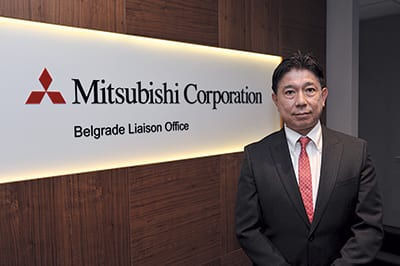Recognising that businesses have life cycles that are influenced by environmental and other factors, Mitsubishi Corporation (MC) will re-profile its portfolio by proactively demonstrating the company’s strengths through the implementation of its mid-term corporate strategy by 2021
Under the new strategy, Mitsubishi Corporation will be implementing a framework of portfolio-based decision making to enable a holistic view of an industry. We will then determine the fields in which it needs to be more proactive and where it needs to replace its assets on the basis of changes in the operating environment.
Mitsubishi Corporation’s portfolio will be structured as a 12-sector matrix, with upstream, midstream and downstream areas along the vertical axis, and four categories along the horizontal axis; Living, Mobility & Infrastructure, Energy & Power Generation and Services, the last of which will include businesses in IT, logistics, finance and so on.
What forms the basis of the Midterm Corporate Strategy?
The Midterm Corporate Strategy 2021 was conceived on the basis of a number of assumptions regarding the external environment in which Mitsubishi Corporation operates. For a start, we expect to see more advances being made in digital technologies and more platform businesses emerging, trends that will likely trigger business model reforms that cut across various industries. In fact, such developments are already underway in the automotive and power industries, and it’s fair to say that we are now truly in the midst of the “Fourth Industrial Revolution.” It would not be a stretch to suggest that the world’s economy will be driven by these new businesses in the future.
Determining the best approaches to digitisation and platform businesses is also a crucial issue for MC, as our decisions will undoubtedly play a big role in shaping its future. We have a responsibility to adapt to the changing times, and to build our envisaged portfolio
What are the priority changes that Mitsubishi Corporation will implement during the medium term period?
Mitsubishi Corporation’s portfolio strategy was, from a historical perspective, the first aspect that needed to be reviewed. It is our responsibility to ensure that the company adapts to the changing times, so we will reshape our portfolio accordingly.

In terms of growth mechanisms, we clarify Mitsubishi Corporation’s cyclical growth model, through which we will identify Potential Growth Sources and nurture them into Core Businesses, and fundamentally review those that have reached stages at which we are unable to add further value. Those reviews will include reallocating capital where necessary.
We will also reform our HR system to ensure reciprocal growth between the company and its employees.
Of course, all measures are aimed at achieving our financial targets. We are confident that, by successfully executing measures described, Mitsubishi Corporation can set its earnings target for the fiscal year 2021 and continue with its progressive dividend scheme. We will also be aiming to increase its dividend payout ratio to 35%, which will enable a dividend of 200 yen per share.
What challenges do you expect to emerge during the realisation of such ambitiously advanced operations?
We are aware that these changes have also brought challenges, some of which are being faced by general society, such as how to better protect personal information and others that are confronting corporations, such as how to adapt existing business models.
Determining the best approaches to digitisation and platform businesses is also a crucial issue for Mitsubishi Corporation, as our decisions will undoubtedly play a big role in shaping its future. We have a responsibility to adapt to the changing times, and to build our envisaged portfolio.